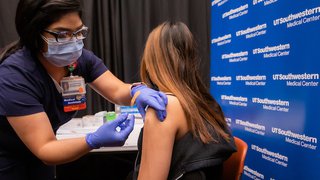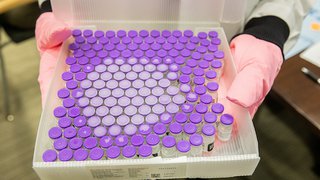Pandemic parenting tips: Trusted resources for raising healthy babies
May 12, 2020

As we navigate the COVID-19 pandemic, parenting may seem like a quest filled with trap doors, hidden obstacles, and new worries around every corner.
Do-it-yourself situations such as homeschooling, creative at-home cooking, and caring for sick loved ones can stir new concerns for some parents:
- Should I wash the 6-year-old's teddy bear…again?
- Was that article I read about breastfeeding and coronavirus legit?
- What if the baby sticks a marble up her nose when I'm on a Zoom call for work?
Add a newborn or pregnancy to the mix, and the voyage may feel overwhelming at times. As a new or expecting parent, you'll likely receive a lot of information from the web and from well-intentioned loved ones. It can be tough to distinguish fact from fiction, particularly when it comes to news and opinions about coronavirus.
Though we're still mostly physically isolated, you don't have to navigate the daily challenges of a pandemic pregnancy and parenting alone.
Our Ob/Gyn and breastfeeding experts have compiled a list of trusted resources to help you manage the what-ifs and how-tos of parenting newborns, older siblings, and teens today.
General health and safety information
All things children's health: The American Academy of Pediatrics
AAP is the premier information source for physical, mental, and emotion wellness for newborns to young adults.
On their homepage, healthychildren.org, AAP has compiled a series of COVID-19 articles that offer a wealth of tips, tools, and resources to guide parents on health, safety, and family cohesiveness – such as introducing older children to the new baby.
The symptom checker tool can also help you determine whether your child might need to see their pediatrician…like for marble-in-nose incidents.
Speaking of pediatricians, it's a smart move to choose one before you deliver. And after the baby arrives, stick to the pediatrician's recommended well-child visit and vaccination schedules. While some other visits might be suspended, the AAP does not recommend skipping newborn appointments.
Health information for infants to teens: KidsHealth
With written and video content designed for parents, children, and teens, kidshealth.org serves the whole family. The Pregnancy & Baby Center features sleeping tips, bottle-feeding information, and parenting recommendations, plus a special section for pregnancy and newborns.
Choking and CPR: American Heart Association
Choking relief and infant CPR (restarting a stopped heart) are imperative for parents. When someone is choking, the airway becomes compressed. Compromised breathing can cause the heart to stop beating.
The American Heart Association offers videos, written instructions, and even training kits to prepare parents for choking and breathing emergencies in infants and older children.
Related reading: Hands Only CPR
Medication and nutrition information: Infant Risk Center
The InfantRisk Center from the Texas Tech University Health Sciences Center site features data-driven recommendations. Topics range from contraceptive options to when babies should start eating solid foods.
It is also an excellent resource on how prescription, over-the-counter, and narcotic drugs such as opioids can affect pregnancy and breastfeeding. InfantRisk nurses manage a chat function to answer visitors' questions.
Related reading: Q&A: Is it safe to take medications while breastfeeding?
Breastfeeding resources
By UT Southwestern Lactation Consultants Annette Frantz MSN RN IBCLC and Linda Catterton BSN RN IBCLC
Breastfeeding can have lasting benefits for mom and baby. For moms, it helps the uterus shrink quicker after delivery and can reduce the risk of type 2 diabetes, breast cancer, and ovarian cancer. Babies benefit by transmission of antibodies to fight diseases and reduced risk of ear and respiratory infections.
UT Southwestern offers virtual classes on breastfeeding and childbirth. Register now or call 214-633-6640 with questions.
We've also compiled several articles on the Your Pregnancy Matters blog about COVID-19, pregnancy, delivery, and breastfeeding:
UTSW COVID-19 parenting and pregnancy articles
The Centers for Disease Control and Prevention (CDC) site includes general breastfeeding information. CDC has also dedicated a portion of its website to information about breastfeeding and COVID-19 and other special circumstances.
At womenshealth.gov, you can access breastfeeding, wellness, and caregiver resources from a collaborative of national organizations. The site also features information about COVID-19, including a symptom checker from the CDC, and resources for chronic illnesses such as sickle cell anemia, HIV, and thyroid disease.
Related reading: How does sickle cell anemia affect pregnancy?
Check out Breastmilk Counts, a Texas-based breastfeeding initiative. The group offers self-care for nursing moms, as well as troubleshooting tips and ways partners can help.
They even offer a downloadable card that cites Texas Health and Safety Code, Chapter 165, which states that a mother can breastfeed anywhere the mother is authorized to be. You can keep the card in your baby bag or hand it out to friends and loved ones who are expecting. Download it here.
Droplet is another excellent resource for breastfeeding support. Their mission is to encourage parents to use the critical first few weeks after birth to develop effective breastfeeding habits.
Another site, MotherToBaby, is managed by The Organization of Teratology Information Specialists (OTIS). This professional scientific society is comprised of experts in birth defects, medications, breastfeeding, and ongoing disease management.
Lactation expert and author Nancy Mohrbacher, IBCLC, FILCA, has approximately 40 years of experience in breastfeeding support. She's written several books and manages a blog and other resources on her site, including her Breastfeeding Solutions app. The app offers up-to-date information on more than 100 topics.
There are also a wide range of apps for your phone or tablet that can help with nursing, pregnancy, and parenting.
If you plan to work outside the home after your baby arrives, read up on your rights regarding breastfeeding in public and pumping at work. The US Breastfeeding Committee and the Texas Mother Friendly site offer up-to-date information.

Get trusted advice from UT Southwestern
Our specialists have been providing facts and valuable context about the COVID-19 pandemic on UT Southwestern's MedBlog, which includes information on everything from treatments and testing to how the virus behaves in the body. There's even recipes for "quarantine cuisine."
Be mindful of information sources
While social media and the internet can be fantastic resources, consider the source of the information you consume. Look for sites that are endorsed by resources such as the AAP or the CDC or check for content from your local hospital.
During pregnancy – especially in a pandemic – is a good time to make a media plan for your family. Limiting screen time can help you avoid news fatigue, as well as encourage you and your older kids to be more active.
Use the AAP's Create Your Family Media Plan and Media Time Calculator to start balancing online and family time based on your children's ages.
While coronavirus has shifted the pregnancy and parenting landscape, know that you are not alone. We encourage you to ask your provider if you encounter questionable content or if you need resources or guidance to navigate pandemic parenting.
On the other side of the pandemic, our goal remains the same as yours: happy, healthy pregnancies and families.
To visit with an Ob/Gyn or a breastfeeding expert, call 214-645-8300 or request an appointment online.
















